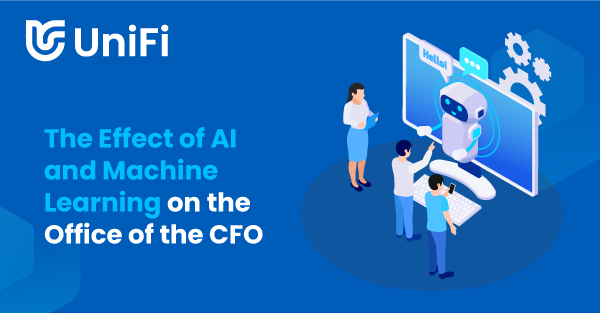The dynamic world of accounting and finance is undergoing a significant transformation driven by artificial intelligence (AI) and machine learning (ML).
Experts reported that AI may be as transformative as electricity and the internet.
This article explores the impact of AI and ML on the office of the Chief Financial Officer (CFO).
Understanding AI and Machine Learning
Artificial Intelligence and machine learning represent the frontier of computational technology, aimed at enabling machines to learn from data, make decisions, and predict outcomes with minimal human intervention.
The finance and accounting industry has already started utilising AI and machine learning technologies in various ways.
These technologies have brought new capabilities to various tasks and are transforming the industry.
AI and ML have not only improved productivity through automation but also made the finance industry more data-driven, efficient, and customer-centric.
Benefits for the Office of the CFO
The adoption of AI and ML in the office of the CFO brings a multitude of advantages:
1. Enhanced Financial Planning and Analysis
AI and machine learning algorithms bring about improved financial forecasting. They can analyse historical financial data, market trends, and external factors to make more accurate predictions about future financial performance.
Additionally, these technologies can identify hidden trends and patterns in financial data that may not be immediately apparent to human analysts. For example, they can detect seasonal fluctuations or anomalies and analyse historical sales data and economic indicators to predict future revenue streams with greater accuracy, helping CFOs make more informed strategic decisions.
2. Increased Automation
AI and machine learning can automate repetitive financial tasks such as data entry, invoice processing, and reconciliations, freeing up time for finance professionals to focus on more strategic activities.
Increased automation reduces manual errors, accelerates processing times, and improves overall efficiency in financial operations.
To give you an idea, an AI-driven invoice processing platform such as UniFi can automatically extract relevant information from invoices, match them with purchase orders, and initiate payment processes, saving time and reducing the risk of errors associated with manual data entry.
3. Improved Risk Management
AI and machine learning can analyse vast amounts of financial data in real time to identify potential risks such as fraud, credit default, or market volatility.
They can detect patterns indicative of fraudulent activities, such as unusual spending patterns or suspicious transactions, enabling CFOs or other financial leaders to take proactive measures to mitigate risks.
4. Enhanced Cybersecurity
AI and machine learning can analyse network traffic, user behaviour, and system vulnerabilities to detect and prevent cyber threats in real time.
They can detect anomalies in user behaviour, such as unauthorised access attempts or unusual data transfers, and automatically trigger alerts or block suspicious activities, protecting financial data from cyber attacks.
5. Customer Insights
AI and machine learning can analyse large volumes of customer data from various sources to provide insights into customer behaviour, preferences, and trends.
These insights help CFOs better understand their customer base, identify opportunities for revenue growth, and tailor financial strategies to meet customer needs more effectively.
Challenges and Considerations
While implementing AI and machine learning in the office of the CFO can bring significant benefits, it also comes with its own set of challenges.
Here are some potential challenges:
- Data Quality and Availability: AI and machine learning models heavily rely on data. Ensuring the quality, accuracy, and availability of data can be a significant challenge. The data may be scattered across different systems in various formats and may require cleaning and preprocessing before it can be used effectively.
- Data Privacy and Security: Financial data is often sensitive and subject to regulations or industry-specific compliance requirements. Maintaining data privacy and security while using AI and machine learning algorithms requires robust protocols and may involve additional legal and compliance considerations.
- Model Interpretability and Explainability: CFOs and their teams need to understand how AI and machine learning models make decisions, especially when those decisions have significant financial implications. Ensuring model interpretability and explainability is crucial for gaining trust and buy-in from stakeholders.
- Integration with Existing Systems: Integrating AI and machine learning systems with existing financial systems and processes can be complex. Compatibility issues, legacy systems, and the need for interoperability may require significant time and resources to address.
- Skill Gap and Talent Acquisition: AI and ML are new technologies. Finance professionals must upgrade their skills to leverage AI and ML, as the old skills may not be enough. The office of the CFO may need to invest in training existing staff or hiring new talent with the necessary expertise.
- Change Management: Introducing AI and machine learning technologies can disrupt existing workflows and processes. Resistance to change, fear of job displacement, and the need for retraining staff are common challenges that must be addressed through effective change management strategies.
Action Steps for the CFO
When implementing AI and machine learning technologies in the office of the CFO, there are several considerations that CFOs should keep in mind:
- Alignment with Business Objectives: Ensure that AI and machine learning initiatives align with the overall strategic objectives of the organisation and the specific goals of the finance department. Focus on solving key financial challenges or improving critical processes.
- Data Governance and Management: Establish robust data governance policies to ensure the quality, accuracy, and security of financial data. Define clear processes for data collection, storage, access, and usage to maintain compliance with regulatory requirements.
- Integration with Existing Systems: Evaluate the compatibility of AI and machine learning systems with existing financial systems and processes. Ensure seamless integration to minimise disruptions and maximise efficiency.
- Change Management: Proactively address employees’ resistance to change by communicating the benefits of AI and machine learning adoption and providing training and support to help staff adapt to new technologies and workflows.
- Ethical and Regulatory Compliance: Consider the ethical implications of AI and machine learning algorithms, particularly in areas such as data privacy, bias mitigation, and transparency. Ensure compliance with relevant regulations and standards, such as GDPR, CCPA, or industry-specific requirements.
- Talent and Skill Development: Invest in talent development to build the necessary skills and expertise within the finance team to effectively leverage AI and machine learning technologies. Provide training opportunities or recruit professionals with data science and analytical capabilities.
- Performance Monitoring and Evaluation: Establish key performance indicators (KPIs) to measure the effectiveness and impact of AI and machine learning initiatives on financial processes and outcomes. Continuously monitor performance and refine strategies based on feedback and results.
- Vendor Selection and Partnerships: Choose reliable technology vendors or partners with proven expertise in AI and machine learning to support implementation efforts. Evaluate vendors based on their track record, industry experience, and ability to meet specific business requirements.
- Cost-Benefit Analysis: Conduct a thorough cost-benefit analysis to assess the financial implications of AI and machine learning adoption, including upfront investment, ongoing maintenance, and expected returns. Ensure that the potential benefits outweigh the costs over the long term.
Conclusion
AI and machine learning offer a game-changing opportunity for the office of the CFO.
By embracing these technologies, CFOs and their finance teams can gain a significant competitive edge through all the benefits listed above.
As AI and ML evolve, CFOs who actively adopt these advancements will be well-positioned to lead their organisations to future success.
Learn about how UniFi AI and ML services can bring significant transformation to your organisation’s financial operations!



